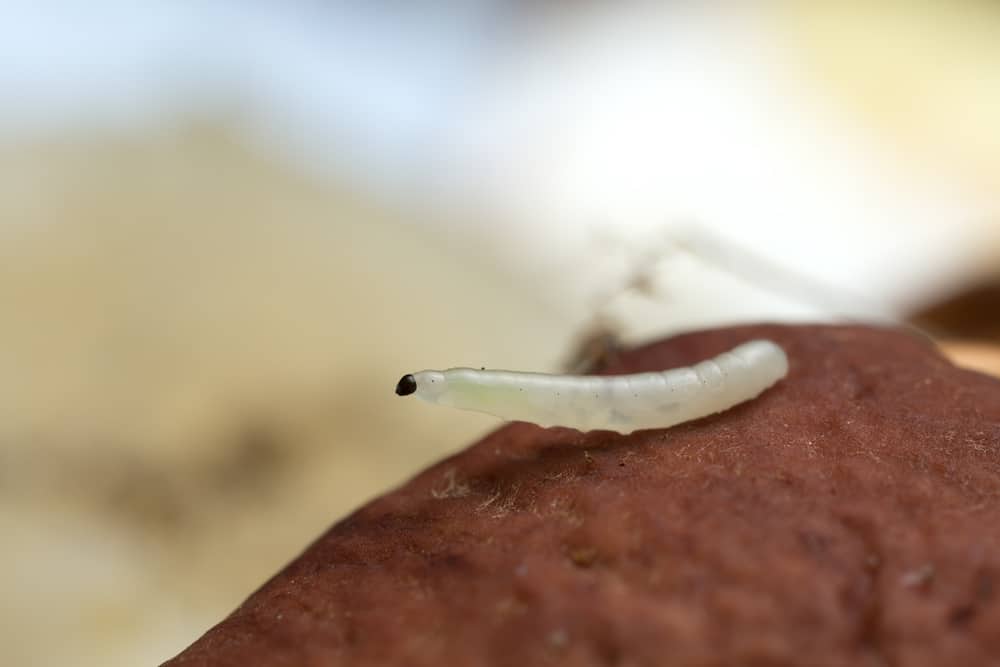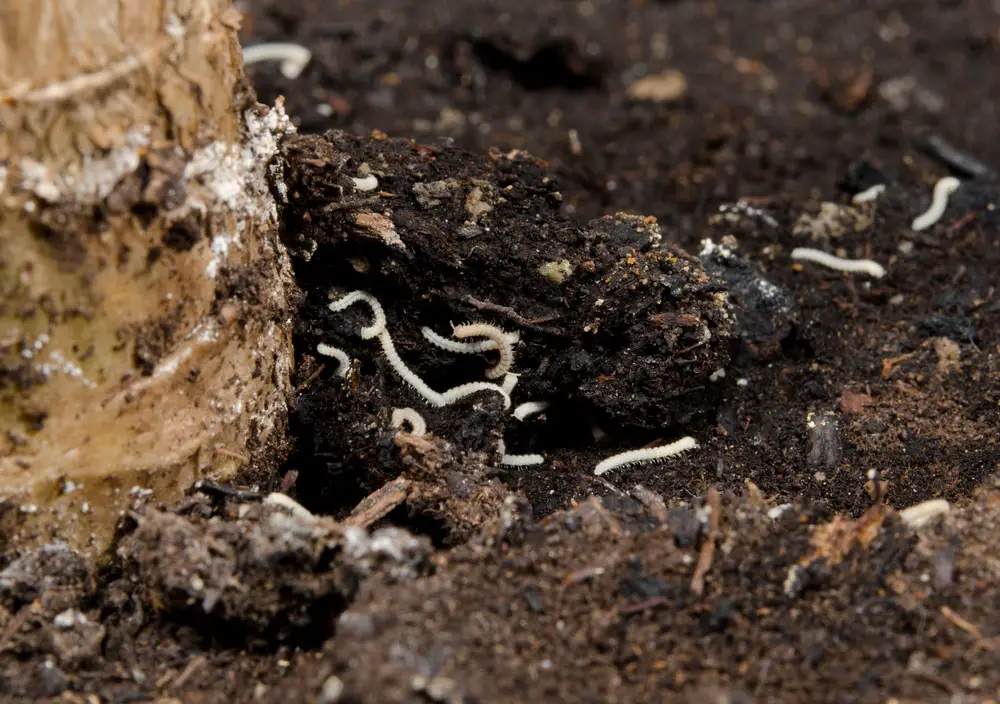Plant cultivation can be a challenging endeavor.
Although some plants are more straightforward to maintain than others, all plants have one thing in common: they may all draw pests.
Tiny White Worms in The Soil and How to Treat the Soil
Tiny white worms in your garden soil could be parasitic nematodes . This parasite is very harmful and attacks roots, foliage and flowers. Make the following adjustments to your compost to get rid of these white worms.
. This parasite is very harmful and attacks roots, foliage and flowers. Make the following adjustments to your compost to get rid of these white worms.
If they’re soft-bodied creatures with no legs and a non-segmented body like a whitish tube – it’s Plant Parasitic Nematode.
White Worms In the Soil: How To Get Rid Of Them
Pot worm populations can be decreased by modifying the pH balance of the compost pile to make it less acidic and more alkaline.
Drying out the compost and lowering the moisture content can also be beneficial.
In essence, pH stands for “power of hydrogen,” which determines acidity.
When too much organic matter is introduced for decomposition or when people add too many foods with high acidity, compost can become overly acidic.
Some of these items are sugars, citrus, dairy products, and processed goods.
What, Then, If Anything, Should You Do If You Discover White Worms In Your Compost?
- Lime aids in compost’s reduction of acidity. Acidity can be neutralized by adding calcium carbonate materials like crushed eggshells or agricultural lime.
- Additionally, good for liming, wood ashes can lessen acidity. Try these if you have any leftover fire ashes. It will also enrich your compost with beneficial potassium.
- A compost pile’s ventilation can be improved to speed up the decomposition of organic matter. If the compost is overly damp, aeration will also assist in drying it out.
- The optimal moisture range is between 40% and 60%. For a while, try reducing moisture to the 40% maximum.
- Reduce humidity and the proportion of acidic organic matter by mixing in dry materials like straw or cardboard shreds.
Why Does The Soil Have Tiny White Worms?
It’s crucial to take action immediately if you spot any infestation or disease in the soil around your plants, or the issue can worsen.
If its neighbor has white worms in the soil, even a brand-new plant with no issues could suddenly turn the other way.
Your house’s plants will be impacted before you know it.
Tiny white worm infestations can result from various factors, so plant caregivers must understand that may be higher.
These Are The Main Causes Of White Worms In Your Soil.
Soil pH
As a gardener, you are probably aware that the soil’s pH affects what can grow there and how healthy particular plants will be.
Did you know that Specific Ph Ranges Can Also Trigger The Emergence Of White Worms?
An unfavorable pH level inhibits new growth and may harm plants. Following this, you’ll have a perfect home for little white worms, which will swiftly multiply.
Rain
It’s vital to remember that rain isn’t always your friend when considering outdoor plants.
Yes, your plants want water, and it is advantageous when light rain provides them with the moisture they require.
However, when the rain is harder, this can occasionally wash away the soil’s vital nutrients because you can have too much of a good thing.
Pests, like small white worms, have the ideal environment to flourish as a direct result.
This is because they require a moist environment to flourish. Hence these bugs are more likely to be found in damper soil.
White worms, in particular, enjoy moist soil, and once they’re there, they’ll reproduce alarmingly quickly, as we’ve already explained. Once this has occurred, it can be very challenging to recover.
Moisture Levels
If you grow indoor plants, you know the need to maintain the proper humidity levels. Diverse plants have different requirements; some like it very dry, while others need much moisture.
However, issues start to appear when a plant is consistently exposed to high moisture levels.
This gets even worse if the plant is not kept clean and hygienic. The plant becomes more vulnerable to pests and other diseases due to soaking up all that liquid.
Although it is bad for the plant, it provides the ideal habitat for the small white worms we are attempting to eradicate.
Fresh Soil
Organic stuff that has decayed naturally will eventually end up in your soil. This category includes dead insects, aged fruit, fallen leaves, and other things.
While a small amount of decomposing organic matter is beneficial and provides those earthworms with food, an excessive amount can cause problems.
It won’t take long for you to start spotting tiny white worms if you leave this problem alone and it gets out of hand.
Additionally, this atmosphere is ideal for these creatures to begin reproducing. The population of white worms will rapidly increase as a result of this.
How to Destroy Tiny White Worms in Your Soil
You can halt the tiny white worms you have discovered in your soil as long as you act fast.
If you have a houseplant, you must remove the top layers of the earth because this is where the majority of the infestation will be.
Put this in a bag and firmly tie it before throwing it away to get rid of it.
If you like, you can simply take all the soil from the plant and repot it, but this is not essential unless you have a significant infestation.
It’s best if the plant isn’t far from outgrowing its pot. After the contaminated dirt has been removed and replenished, you still cannot relax. You must use an insecticide treatment, no matter what.
Choose a chemical that is suitable for the sort of plant you are treating, and if you are treating an indoor plant, go with an indoor chemical:
- Neem oil can treat your plant if you want to make a more natural decision.
- You must combine your 1 1/2 teaspoon of neem oil with a little teaspoon of liquid soap before adding it to a liter of water.
- Another mild yet powerful option is water and castile soap.
Just be sure to use it sparingly; for every liter of water, you only need around one teaspoon of castile soap.
Can I Stop White Worms from Living in My Soil?
To avoid having to treat white worm infestations, it would be wise to attempt and prevent them from occurring in the first place.
However, even after treating an infection, you can use the advice below to avert further issues. You must pay close attention to your soil’s moisture content above all else.
Avoid giving your plant too much water, and ensure the soil is dry before adding any more.
Although each plant is unique, and some may require more regular watering than others, a tool like a soil moisture meter can be helpful.
Additionally, employing a mister instead of just pouring water into the ground is safer and will guarantee that the earth isn’t too wet. Exposed damp soil will attract fungus gnats.
Covering your soil is a smart option if you have a plant that needs watering more frequently.
Sand, pebbles, or gravel are just a few options you can utilize, and they all look fantastic.
Experience has taught us that it is crucial to ensure that your soil’s pH balance is ideal. You can change this and stop white worms by adding specific items if necessary.
In addition to using lime or phosphorus, wood ash can also be used effectively.
This is also helpful if you’re seeking to stop an infestation because the population will decline after these things are used.
Last but not least, regularly inspect new plants for indications of an infestation. Never bring a plant back inside after leaving it outside without first checking it.
How Long Ought The Process To Last?
It should not take long for the treatment to start working. However, spraying insecticide on the plant will quickly eliminate an infestation.
To expedite the procedure, you can also remove any apparent white worms by hand.
This is especially helpful for infestations that are not very significant.
Naturally, treating more severe issues can take longer, and in extreme circumstances, you might even have to concede defeat and replace the entire soil.
Are White Worms Good For The Soil?
It’s not necessarily bad if white worms are discovered in compost.
Their presence won’t harm the composting process.
Even so, it might be a hint that the compost is less friendly to the more advantageous worms, like red wigglers.
White worms make excellent compost on their own. They transform organic waste into a useful soil supplement, much like earthworms or red wigglers. They thereby aid in the composting process overall.
When the circumstances are ideal, pot worms can reproduce quickly, leading to a sizeable colony.
Vermicompost Contains Tiny White Worms.
The environment may be excessively acidic if you find white worms in your vermicompost. You should normally steer clear of this circumstance.
Red worms, known as red wigglers, are said to be superior to their white counterparts when it comes to composting, especially if you have a worm farm.
The red worm has a unique digestive system that it uses to produce vermicast, a type of nutrient-rich compost, from food scraps and other organic materials.
Red worms are best used when vermicomposting (composting with worms) is being done.
Red worms are less likely to be present in the compost if white worms are more common.
Red worms are sensitive to pH levels, which are crucial to their survival and growth. All worms have delicate skin, and pH levels impact them.
A lower pH and more acidic conditions, which drive red wigglers away and impede the composting process, are indicated by white worms in compost. It might also imply that your compost is overly moist.
How Do Pot Worms Work?
These thread-like organisms could either be pot worms or larvae of fungus gnats.

They pose an issue for your plants since they will attack the roots and remove all the soil’s organic matter, which provides nutrients.
What to anticipate There’s no need to panic just yet if you’ve found these tiny creatures on your soil. You have options for getting rid of them while preserving your plant.
Any type of soil you look at will have some worm presence if it is healthy. Some worms, like earthworms, are considered to be good for your soil because they are decomposers.
They decompose the organic stuff in the soil into nutrients for your plants. There are numerous additional worm species, including the pot worm, which is frequently confused for the young red wriggler (an earthworm species).
You might be surprised to learn that although these pot worms are virtually always present, they have the potential to spread and turn an area into an infestation.
It’s better to attack the issue as soon as possible since once they become established in the soil, they breed incredibly quickly.
They won’t harm your plants as much as fungus gnat larvae, but they could cause root rot and wilting leaves in the worst circumstances.
Additionally, once established, they make it impossible for the common red wriggler to establish a camp, preventing your plant from benefiting from these creatures.
What Are Larvae of Fungus Gnats?
Sometimes the small white worms you see hiding in the dirt of your favorite home plant are something else.
They are young fungus gnats. A tiny flying insect known as a fungus gnat is often spotted hovering near plants and soil.
In addition to being unsightly, these larvae can injure your plant if they are an infestation. They will completely deplete the soil’s valuable organic matter, leaving very little for your plant to survive.
Additionally, root rot will very certainly affect your plant if the infestation is not controlled. Fungus gnat larvae are also a problem because they are persistent and will spread if you have multiple plants adjacent to one another.
Final Thoughts on Tiny White Worms in the Soil and How to Treat the Soil
Composting can be difficult. You’ll likely run into a variety of issues while composting. Including strange occurrences in the pile!
Given that they naturally occur in compost, white pot worms are neither good nor harmful in and of themselves.
One approach to get back on track is to lower the pH of the compost.
Nevertheless, mastering efficient composting methods and averting issues will improve the process for everyone—including the worms!
If you have found little white worms in your soil, they might be pot worms or larvae of fungus gnats.
These deplete the organic matter in the ground, frequently leaving insufficient amounts for your plant, which suffers as a result.
Although they are simple to get rid of them, you need to start treating this on an urgent basis now and get ahead of a potential problem!
Happy pest-free gardening!
Read More:
12 Tips to Get Rid of Grub Worms on your Lawn
11 Plants That Don’t Like Mushroom Compost
How to Make Compost – A Step by Step Guide

